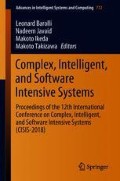Abstract
Some daily tasks can be tedious or consume a great amount of time for humans to finish, such as scheduling a meeting, organize a trip, find a job, buy a house and so on. However, using agents to perform our daily tasks requires social interaction and conflicts resolution. Many negotiating agents have been implemented to manage and solve these conflicts. Although, up until now, truly autonomous negotiators have rarely been deployed in real-world applications. In order to take one step further towards these limitations, we propose a negotiating BDI-agent based on Multi-Context Systems that use bounded rationality during the negotiation. Multi-Context Systems enable the agent to reason under the presence of many types of information, where each context may use different types of logic. As a type of bounded rationality, Aspiration Adaptation Theory can be used to define the most important issues. To illustrate our proposal, we modeled a round of a real-world negotiation scenario, where an agent has to negotiate the hiring terms of a job under a limited time session and a high number of possible agreements.
Access this chapter
Tax calculation will be finalised at checkout
Purchases are for personal use only
References
Baarslag, T., et al.: When will negotiation agents be able to represent us? the challenges and opportunities for autonomous negotiators (2017)
Brewka, G., Eiter, T.: Equilibria in heterogeneous nonmonotonic multi-context systems. AAAI 7, 385–390 (2007)
Brewka, G., et al.: Managed multi-context systems. In: IJCAI Proceedings-International Joint Conference on Artif Intelligence, vol. 22(1), p. 786 (2011)
Castelfranchi, C.: Modelling social action for AI agents. Artif. Intell. 103(1–2), 157–182 (1998)
Casali, A., Godo, L., Sierra, C.: Graded BDI models for agent architectures. In: Lecture Notes in Computer Science (including subseries Lecture Notes in Artificial Intelligence and Lecture Notes in Bioinformatics). LNAI, vol. 3487, pp. 126–143 (2005)
Casali, A., Godo, L., Sierra, C.: A graded BDI agent model to represent and reason about preferences. Artif. Intell. 175(7–8), 1468–1478 (2011). https://doi.org/10.1016/j.artint.2010.12.006
Gelaim, T.A., Silveira, R.A., Marchi, J.: Towards a model of cognitive agents: integrating emotion on trust. In: Proceedings of the 2015 Fourteenth Mexican International Conference on Artificial Intelligence (MICAI), pp. 80–86. IEEE Computer Society (2015)
Ito, T., Klein, M., Hattori, H.: A multi-issue negotiation protocol among agents with nonlinear utility functions. Multiagent Grid Syst. 4(1), 67–83 (2008)
Jennings, N.R., et al.: Automated negotiation: prospects, methods and challenges. Group Decis. Negot. 10(2), 199–215 (2001)
de Jonge, D., Zhang, D.: Automated negotiations for general game playing. In: Larson, K., et al. (eds.) Proceedings of the 16th Conference on Autonomous Agents and MultiAgent Systems, AAMAS 2017, São Paulo, Brazil, 8–12 May 2017, pp. 371–379. ACM (2017)
Kraus, S.: Negotiation and cooperation in multi-agent environments. Artif. Intell. 94(1), 79–97 (1997)
Koster, A., Schorlemmer, M., Sabater-Mir, J.: Opening the black box of trust: Reasoning about trust models in a BDI agent. J. Logic Comput. 23(1), 25–58 (2013). https://doi.org/10.1093/logcom/exs003
Lin, R., et al.: Negotiating with bounded rational agents in environments with incomplete information using an automated agent. Artif. Intell. 172(6–7), 823–851 (2008)
Marsa-Maestre, I., et al.: Balancing utility and deal probability for auction- based negotiations in highly nonlinear utility spaces. IJCAI 9, 214–219 (2009)
Marsa-Maestre, I., et al.: Effective bidding and deal identification for negotiations in highly nonlinear scenarios. In: Proceedings of the 8th International Conference on Autonomous Agents and Multiagent Systems, International Foundation for Autonomous Agents and Multiagent Systems, vol. 2, pp. 1057–1064 (2009)
Pinyol, I., et al.: Reputation-based decisions for logic-based cognitive agents. Auton. Agents Multi-Agent Syst. 24(1), 175–216 (2012). https://doi.org/10.1007/s10458-010-9149-Y
Parsons, S., Sierra, C., Jennings, N.: Agents that reason and negotiate by arguing. J. Logic Comput. 8(3), 261–292 (1998)
Rosenfeld, A., Kraus, S.: Modeling agents based on aspiration adaptation theory. Auton. Agent. Multi-Agent Syst. 24(2), 221–254 (2012)
Rosenfeld, A., et al.: NegoChat: a chat-based negotiation agent. In: Proceedings of the 2014 international Conference on Autonomous Agents and Multi-Agent Systems. International Foundation for Autonomous Agents and Multiagent Systems. 2014, pp. 525–532 (2014)
Rosenfeld, A., et al.: NegoChat-A: a chat-based negotiation agent with bounded rationality. Auton. Agent. Multi-Agent Syst. 30(1), 60–81 (2016)
Selten, R.: Aspiration adaptation theory. J. Math. Psychol. 42(2–3), 191–214 (1998)
Trescak, T., et al.: Dispute resolution using argumentation-based mediation. arXiv preprint arXiv:1409.4164 (2014)
Wooldridge, M.: An Introduction to Multiagent Systems. Wiley, Chichester (2009)
Zhu, W., Jiang, Z.-P.: Event-based leader-following consensus of multi-agent systems with input time delay. IEEE Trans. Autom. Control 60(5), 1362–1367 (2015)
Author information
Authors and Affiliations
Corresponding author
Editor information
Editors and Affiliations
Rights and permissions
Copyright information
© 2019 Springer International Publishing AG, part of Springer Nature
About this paper
Cite this paper
de Mello, R.R.P., Gelaim, T.Â., Silveira, R.A. (2019). Negotiating Agents: A Model Based on BDI Architecture and Multi-Context Systems Using Aspiration Adaptation Theory as a Negotiation Strategy. In: Barolli, L., Javaid, N., Ikeda, M., Takizawa, M. (eds) Complex, Intelligent, and Software Intensive Systems. CISIS 2018. Advances in Intelligent Systems and Computing, vol 772. Springer, Cham. https://doi.org/10.1007/978-3-319-93659-8_31
Download citation
DOI: https://doi.org/10.1007/978-3-319-93659-8_31
Published:
Publisher Name: Springer, Cham
Print ISBN: 978-3-319-93658-1
Online ISBN: 978-3-319-93659-8
eBook Packages: Intelligent Technologies and RoboticsIntelligent Technologies and Robotics (R0)

